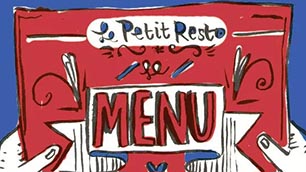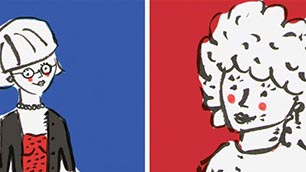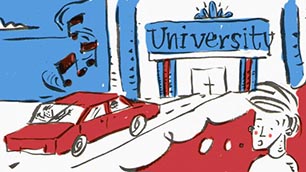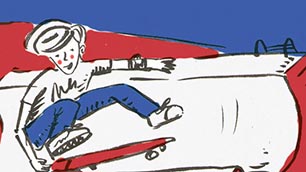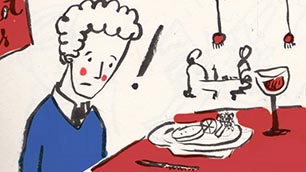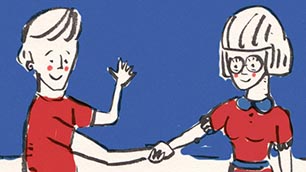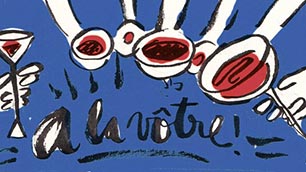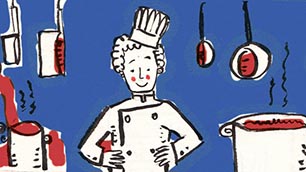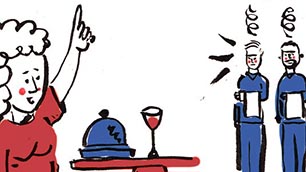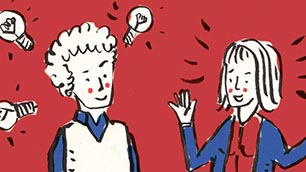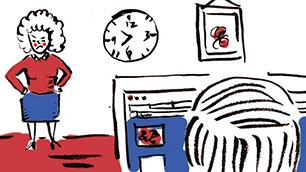| Valérie: | Let's practice with more common verbs of the first group. By the way, how many do you know Michelle? |
| Michelle: | Euh, about 10 I think. Aimer, détester, parler, écouter, regarder, étudier, demander, chercher; trouver, habiter and I think there’s one more... |
| Valérie: | To work? |
| Michelle: | Oui, I have a hard time remembering that one, I don’t know why... |
| Valérie: | Tra... |
| Michelle: | Tra...travailler. |
| Valérie: | Great! Let’s try to remember l'élision as well as la liaison when we conjugate. What about definite articles? |
| Michelle: | Ils sont difficult. |
| Valérie: | Non, ils ne sont pas difficiles. Il y a... |
| Michelle: | Il y a... there is, there are. |
| Valérie: | Il y a le, il y a la... |
| Michelle: | Il y a les. |
| Valérie: | And sometimes le and la can become... |
| Michelle: | Oui, they become l with the... oh, I forgot what it’s called again. |
| Valérie: | L’apostrophe. The apostrophe. |
| Michelle: | L apostrophe. |
| Valérie: | Bien. When do we use l'apostrophe ? |
| Michelle: | When the noun starts with a vowel, like in l’insecte. |
| Valérie: | L’aventure, l’escargot, l'université, l’Irlande. Let’s make sentences with plural personal pronouns nous and vous. |
| Michelle: | Ok. Nous parlons anglais. Vous aimez français. |
| Valérie: | Bien, you did the liaison with vous. Let’s determine the noun français. It’s masculine. |
| Michelle: | Vous aimez le français, ils détestent le français, elles étudient le français. |
| Valérie: | Très bien. Let me show a little trick now to make more complex sentences. You could say: j’aime followed by a verb in the infinitive. |
| Michelle: | Neat! J’aime étudier le français, j’aime écouter le français, j’aime habiter in France. |
| Valérie: | Habiter en France. |
| Michelle: | J’aime habiter en France. Je préfère habiter en France |
| Valérie: | Vous n’aimez pas habiter aux États-Unis Michelle ? |
| Michelle: | Oui, well, j’aime habiter aux États-Unis un peu but je préfère la France. |
| Valérie: | Pourquoi ? |
| Michelle: | Why? Nous travaillons a lot here... |
| Valérie: | Nous travaillons beaucoup. |
| Michelle: | Oui, nous, Americans, nous travaillons beaucoup. |
| Valérie: | Les Français travaillent beaucoup aussi, as well. |
| Michelle: | Ah bon ? |
| Valérie: | Oui, oui. Vous n’aimez pas travailler ? |
| Michelle: | Oui, j’aime travailler but je ne travaille pas. |
| Valérie: | Pourquoi ? |
| Michelle: | I don’t need to work. |
| Valérie: | You know how to say that in French with ‘avoir besoin de’ followed by the infinitive. |
| Michelle: | Hang on...J’ai besoin de... Non, je n’ai pas besoin de travailler. My husband travaille beaucoup, il travaille for two. |
| Valérie: | Il aime travailler ? |
| Michelle: | Oui, il aime travailler... I think so anyway. Je ne suis pas sûre. Il a besoin de travailler. En général, les hommes, men, aiment travailler et ont besoin de travailler. |
| Valérie: | Ah! Et les femmes ? |
| Michelle: | Les femmes... Elles aiment travailler, maybe... If they need to... |
| Valérie: | Hmm, interesting perspective on men... et les femmes, elles aiment... |
| Michelle: | Elles aiment étudier, elles aiment to read, lire ? |
| Valérie: | Oui, lire. |
| Michelle: | Elles aiment lire magazine. |
| Valérie: | You need an article in front of "magazine". It’s masculine. |
| Michelle: | Elles aiment lire le magazine. Elles aiment écouter la radio. |
| Valérie: | Bien. |
| Michelle: | Elles n’aiment pas les problèmes. Elles aiment independence. |
| Valérie: | Good, but don’t forget the article in front of the noun. En français, indépendance. |
| Michelle: | OK, so... indépendance starts with a vowel, so I need the l...the l apostrophe. |
| Valérie: | Parfait. |
| Michelle: | Elles aiment l’indépendance, oui ? |
| Valérie: | Oui, les femmes aiment l’indépendance. |
| Michelle: | Nous aimons l'indépendance. Viva l’indépendance! |
| Valérie: | Vive l’indépendance! |




